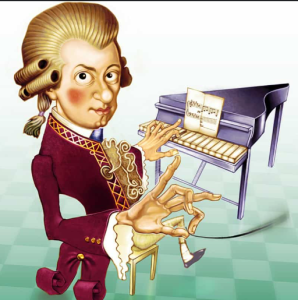Thì quá khứ đơn là gì?
Ví dụ về thì quá khứ đơn

wolfgang Amadeus Mozart was an Austrian mucian and composer. He lived from 1756 to 1791. He started composing at the age of five and wrote more than 600 pieces of music. He was only 35 years old when he died.
Lived /started/wrote/was/died đó là thì quá khứ đơn
Cách sử dụng thì quá khứ đơn
Thường thì quá khứ đơn kết thúc bằng -ed (động từ bất quy tắc)
- I work in a travel agency now. Before that I worked in a department store.
- We invited them to our party, but they decided not to come.
- The police stopped me on my way home last night.
- Laura passed her exam because she studied very hard.
For spelling (stopped, studied etc.)
Nhưng nhiều nhưng nhiều động từ bất quy tắc:
write -> wrote
see -> saw
go -> went
shut -> shut
Nhiều trường hợp quá khứ đơn không kết thúc bằng -ed.
- Mozart wrote more than 600 pieces of music.
- We saw Tanya in town a few days ago.
- I went to the cinema three times last week.
- It was cold, so I shut the window.
Trong câu hỏi và câu phủ định chúng ta sử dụng did/didn’t + infinitive (enjoy/see/go etc)
Trong câu hỏi sẽ có mẫu câu như sau:
| did | you | enjoy? |
| she | see? | |
| they | go? |
Trong câu phủ định sẽ có mẫu câu như sau:
| I | didn’t | enjoy? |
| she | see? | |
| they | go? |
- A: Did you go out last night?
B: Yes, I went to the cinema, but I didn’t enjoy the film much.
- ‘When did Mr Thomas die? ‘About ten years ago’
- They didn’t invite us to the party, so we didn’t go.
- ‘Did you have time to do the shopping?’ ‘No, I didn’t‘
Trong ví dụ mẫu câu, từ do là động từ chính trong mẫu câu (did … do / didn’t do):
- What did you do at the weekend? (not What did you at the weekend?)
- I didn’t do anything. (not I didn’t anything)
Quá khứ của động từ tobe (am/is/are) chính là was/were:
Đối với câu khẳng định và câu phủ định ta sẽ có mẫu câu sau:
- I/he/she/it + was/wasn’t
- We/you/they + were/weren’t
Đối với câu hỏi ta sẽ có mẫu câu sau:
- was + I/he/she/it?
- were + we/you/they?
Chú ý rằng chủ ta không sử dụng did trong câu phủ định và câu hỏi với was/were:
- I was angry because they were late.
- Was the weather good when you were on holiday?
- They weren’t able to come because they were so busy.
- Did you go out last night or were you too tired?